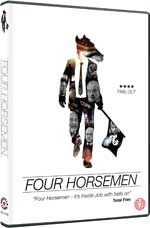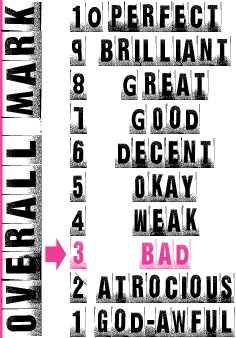
Director: Ross Ashcroft
Running Time: 98 mins
Certificate: E
Release Date: April 2nd, 2012

It’s very rare that something actually makes me angry, but Four Horsemen did. The documentary tries to deflect criticism by saying during the voiceover that some will dismiss it as socialist when it isn’t, but my problem with it wasn’t with its viewpoint, but that as an argument it’s absolutely hideously constructed and an altogether frustrating experience.
Made in the wake of the banking collapse and economic crisis, Four Horsemen attempts to explain what happened, why we haven’t learned any lessons from it, and why western society is on the brink of collapse and unable to come to terms with the fact its version of civilisation may have peaked. Much of it is stuff many will have heard before, especially as the economic collapse has been picked apart in detail by numerous different voices. It doesn’t help that Four Horsemen has little new to add, and most of what it does have to say has been said better by others – the wonderful The Shock Doctrine and Inside Job spring to mind.
However it wouldn’t necessarily be a bad thing to say it again, even with a rather ‘we’re all doomed and isn’t western civilisation an ass?’ mantra added on top. The problem I had with it though is the way its puts its point across, which is to constantly use conclusions as evidence. For example, the film has decided western civilisation as we know it is over, so rather than arguing that point from the ground up, it extrapolates backward, so that everything about the modern day becomes evidence for its imminent end. For example, perhaps idolising chefs is something that happens just before civilisations end, but rather than providing evidence, the film presents it as an odd but indisputable fact.
It’s not even that what Four Horsemen say is necessarily untrue, it’s just horribly argued. It results in the film becoming a complete house of cards that can be blown over ridiculously easily, not because it’s wrong but because it’s not structured in a way that builds towards a conclusion, but instead decides the end result and then finds the evidence for it. It means that if you generally agree with its ‘Occupy Wall Street’-style philosophy, you’ll lap up, but if you’re on the other side of the argument, Four Horsemen makes itself way too easy to dismiss.
It’s a shame as the film has a lot of very knowledgeable interview subjects who have a lot of interesting stuff to say, but then the voiceover chimes in and presents something as an absolute which is nothing of the sort, and I for one just wanted to scream at the screen, ‘Why is that necessarily true?’ But rather than bothering to explain, it moves onto the next reason we’re all doomed. It’s a rather condescending way to make a documentary and very frustrating.
It might have helped if the documentary was more focussed, but it’s so keen to cover every ill of the West it can find, even if it’s only tangentially linked to its core subject – from what it sees as the self-interest of foreign aid to the flaws of democracy – that it doesn’t present a truly convincing argument for any of it.
Four Horsemen has a lot of important questions to ask. Why have we allowed the financial system – something that doesn’t actually ‘produce’ anything – hold so much power? How can so much of the world’s wealth be based on debt? Why has the enormous growth in sheer amount of money in the past 60 years not resulted in a fairer distribution of wealth? With its interview subjects it has the potential to say a lot of fascinating things about it, but the structure and voiceover is so busy putting the cart before the horse that it will ultimately only be of interest to those who already believe everything it’s got to say and want something that feels like it’s backing them up.
Overall Verdict: A bit of a missed opportunity. There’s nothing intrinsically wrong with polemic, but Four Horsemen could have done with studying the art of rhetoric in order to make its arguments stronger. Actually, that’s the one thing about the West it doesn’t criticise but perhaps should– that generally the quality of argument has gone completely down the tubes.
Reviewer: Tim Isaac





Leave a Reply (if comment does not appear immediately, it may have been held for moderation)